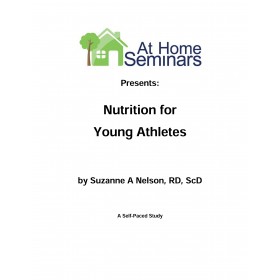Details
Nutrition for Young Athletes, 6th Ed
SKU: 509
By Suzanne Steen, DSC, RD
Essential for working with schools, parents, and competitive athletes! This new 6th edition provides guidelines for boosting performance, limiting risk and promoting healthy development in young exercisers and competitors.
Topics include: the relationship of motor development to sports activities; assessing nutrient needs; energy production; fluid and electrolytes; weight control, dieting and much more
An excellent course for fitness professionals dealing with children and adolescents!
Course Length: 10.0 contact hours
Instructional Level: Advanced
Nutrition for Young Athletes, 6th Ed
Course Goals and Objectives:
BEHAVIORAL OBJECTIVES
Upon successful completion of this course the student will be able to:
1. Identify how to assess growth and development in children and adolescents.
2. Identify the relationship of maturation and training.
3. Identify how body composition relates to athletic performance.
4. List five factors that increase the risk of dehydration in children and compare to adults.
5. Identify fluid replacement guidelines for young athletes before, during, and after activity.
6. Identify five ways to prevent heat disorders in young athletes.
7. List appropriate food choices for pre-event and post-event meals.
8. Identify the diagnostic criteria, physical symptoms, and medical complications of various types of eating disorders.
9. Identify safety concerns and health risks associated with the use of performance enhancing supplements in children and adolescents.
10. Identify the limitations of body composition assessment in youth.
11. Name five tips for coaches and parents to consider when working with an overweight child.
12. Identify how guidelines for weight loss and weight gain in children and adolescents differ, depending on age.
13. Identify factors that impact protein requirements in youth.
14. Identify the relationship of carbohydrate to exercise and performance in youth.
15. Identify a diet that meets the calorie, protein, carbohydrate and fat requirements of young athletes based on age, sex, height, body composition, performance goals and training intensity.
16. Identify the physiological and nutritional problems associated with making weight in wrestling.
17. Identify guidelines in helping young athletes make healthy food choices on the road.

















